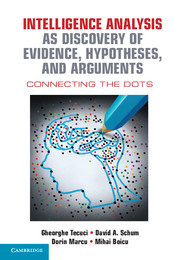Book contents
- Frontmatter
- Contents
- Preface
- Acknowledgments
- About the Authors
- 1 Intelligence Analysis: “Connecting the Dots”
- 2 Marshaling Thoughts and Evidence for Imaginative Analysis
- 3 Disciple-CD: A Cognitive Assistant for Connecting the Dots
- 4 Evidence
- 5 Divide and Conquer: A Necessary Approach to Complex Analysis
- 6 Assessing the Believability of Evidence
- 7 Chains of Custody
- 8 Recurrent Substance-Blind Combinations of Evidence
- 9 Major Sources of Uncertainty in Masses of Evidence
- 10 Assessing and Reporting Uncertainty: Some Alternative Methods
- 11 Analytic Bias
- 12 Learning and Reusing Analytic Expertise: Beyond Disciple-CD
- Glossary of Terms
- References
- Appendixes
- Index
Preface
Published online by Cambridge University Press: 05 August 2016
- Frontmatter
- Contents
- Preface
- Acknowledgments
- About the Authors
- 1 Intelligence Analysis: “Connecting the Dots”
- 2 Marshaling Thoughts and Evidence for Imaginative Analysis
- 3 Disciple-CD: A Cognitive Assistant for Connecting the Dots
- 4 Evidence
- 5 Divide and Conquer: A Necessary Approach to Complex Analysis
- 6 Assessing the Believability of Evidence
- 7 Chains of Custody
- 8 Recurrent Substance-Blind Combinations of Evidence
- 9 Major Sources of Uncertainty in Masses of Evidence
- 10 Assessing and Reporting Uncertainty: Some Alternative Methods
- 11 Analytic Bias
- 12 Learning and Reusing Analytic Expertise: Beyond Disciple-CD
- Glossary of Terms
- References
- Appendixes
- Index
Summary
BOOK PURPOSE
This textbook has been written for those studying the process of drawing conclusions from masses of evidence resulting from extensive investigations in a variety of contexts, including intelligence analysis, cybersecurity, criminal investigations, and military and business inferences and decisions. Many universities now offer undergraduate and graduate courses concerning these activities. These courses are offered in order to provide introductory preparation for persons contemplating future work in these contexts. These courses have also been of interest to persons having various levels of past experience in these activities, but who are seeking additional knowledge concerning matters their current work requires.
As you see, our book's subtitle is a frequently used metaphor: Connecting the Dots. This metaphor seems appropriate in characterizing the evidential and inferential matters discussed in our book. The metaphor may have gained its current popularity following the terrorist attacks in New York City and Washington, D.C., on September 11, 2001. It was frequently said that the intelligence services did not connect the dots appropriately in order to have possibly prevented the catastrophes that occurred. Since then, we have seen and heard this metaphor applied in the news media to inferences in a very wide array of contexts in addition to the aforementioned intelligence, legal, military, and business contexts. For example, we have seen it applied to allegedly faulty medical diagnoses; to allegedly faulty conclusions in historical studies; to allegedly faulty or unpopular governmental decisions; and in discussions involving the conclusions reached by competing politicians. What is also true is that the commentators on television and radio, or the sources of written accounts of inferential failures, never tell us what they mean by the phrase “connecting the dots.” A natural explanation is that they have never even considered what this phrase means and what it might involve.
Our major objective in this book is to provide accurate, useful, and extensive information about the evidential and inferential issues encountered by persons whose tasks require them to “connect the dots” to draw conclusions from masses of different kinds of evidence that come from a variety of different sources.
Information
- Type
- Chapter
- Information
- Intelligence Analysis as Discovery of Evidence, Hypotheses, and ArgumentsConnecting the Dots, pp. xiii - xviiiPublisher: Cambridge University PressPrint publication year: 2016
